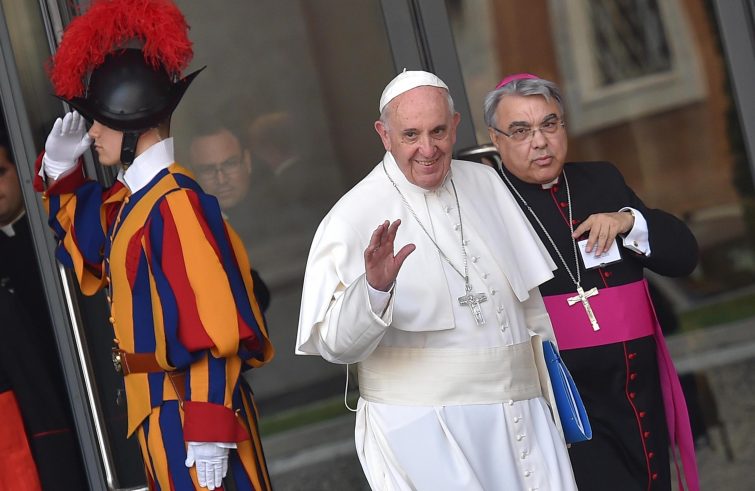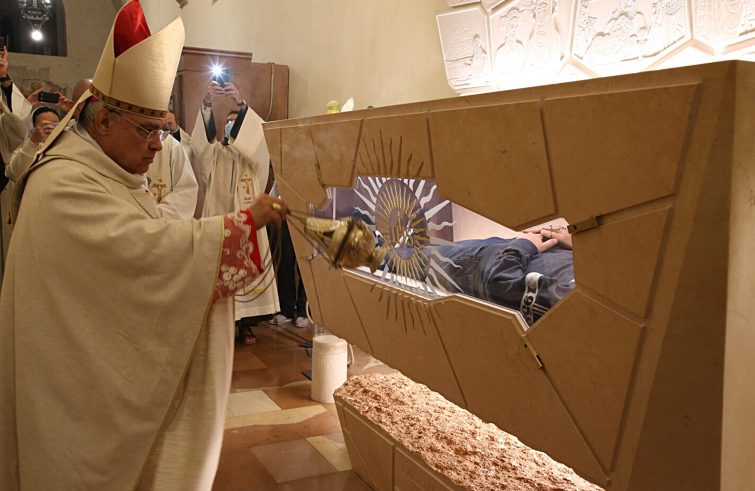
“While for public health purposes we were imposed a number of restrictions, and of course not only us, as regards the practice of religious activity and different kinds of gatherings and formation in our communities, spiritual and practical acts of mercy have continued, with commendable gestures that bear witness to the faith.” The first Solemnity of All Saints that Msgr. Marcello Semeraro is celebrating today is the first in his capacities as Prefect of the Congregation for the Causes of Saints, a position he holds since October 15. In fact he was appointed just a week ago by Pope Francis, who will create him Cardinal in the Consistory of November 28, together with 12 other new cardinals.
You served as Secretary of the Council of Cardinals, created to advise him in the government of the universal church and to study a plan for revising the Apostolic Constitution. How is the Curia Reform progressing?
The Council of Cardinals has completed the work on the Apostolic Constitution on the Roman Curia. At the beginning of last summer it submitted a document to the Pope, who, as customary, sent it to the competent bodies for further analysis, after which Francis will decide the date of its promulgation. However, due importance will be given to the fact that a number of initiatives and studies have already been carried out in recent years, which will be preserved and integrated into the final document. The Pope made a preliminary list of these in his Address to the Roman Curia on December 22, 2016, which will now be updated by the Pope.
Thus, the “reform” is not “yet to begin”, but is in fact already “in progress.”
There is widespread indignation at the recent incidents in the Vatican which, inter alia, involve your predecessor at the head of the Congregation. Would you like to comment on this?
“I have no elements to make judgements on this matter; rather, I feel saddened to learn of episodes which, if true, show a face that is far removed from the beautiful face of the Church.” There is a poem by Edmondo De Amicis that I recall from my childhood, whose opening line is: “Time does not always erase beauty…” and concludes: “I would like to see myself old and she…from sacrifice, rejuvenated.” If, as I was saying, these episodes reflected actual reality, they would reproduce the teachings of the Second Vatican Council in all seriousness, namely, that the Church “is at the same time holy and always in need of being purified”, and only by looking at Christ who “knew nothing of sin, but came to expiate only the sins of the people” can she (and we her children in her) proceed on the path of penance and renewal (cf. Lumen Gentium, n. 8).

Your appointment took place five days after the beatification of Carlo Acutis and you celebrated the Mass marking the closing of his tomb. Could he be an inspirational figure for young people?
I am grateful to Archbishop Domenico Sorrentino who asked me to officiate the closing celebrations for the beatification of Carlo Acutis. This event, occurring at the beginning of my new ministry, inspired me to choose this young man as my companion for the new path. The Pope wrote about him in the exhortation “Christus vivit”, mentioning his powerful words: “All people are born as originals but many die as photocopies”. This expression could very well be voiced by Francis himself. The Pope also referred to him after the Angelus prayer on October 11 last. He described Carlo as a “Blessed Millennial”, a “15-year-old youth enamoured of the Eucharist”, who “did not ease into comfortable immobilism, but understood the needs of his time, because he saw the face of Christ in the weakest.” Francis concluded: “His witness indicates to today’s young people that true happiness is found by putting God in first place and serving Him in our brothers and sisters, especially the least.” Exempla trahunt goes a well-known Latin saying, reiterated also by St. Gregory the Great.
More importantly than words, setting the example is a powerful source of inspiration .
This is testified by the high number of pilgrims that came to Assisi.
Is there a need to reconsider the way of speaking of the saints today, bringing them closer to the faithful and easier to relate to?
The “saints” (not only those canonized and for various reasons not raised to the honours of the altars) are invariably in a Church rendered holy and purified by the blood of Christ. Holiness is never an isolated event. In fact, the Council referred to a “universal vocation to holiness” and recalled that holiness is one and polyphonic, as it is manifested “in the may classes and duties of life”, n. 41). From time to time a certain kind of hagiography described saints as extraordinary figures, who lived in exceptional contexts. In the Apostolic Letter “Novo Millennio Ineunte” (2001) St. John Paul II wrote: “The time has come to re-propose wholeheartedly to everyone this high standard of ordinary Christian living: the whole life of the Christian community and of Christian families must lead in this direction. It is also clear however that the paths to holiness are personal and call for a genuine training in holiness, adapted to people’s needs.” (n.31) Holiness does not reside in extraordinariness but in the heroic exercise of the theological and cardinal virtues.
The pandemic afflicting the whole world exposes many egoisms, while also highlighting the generosity and altruism of many who are not surrendering to evil. Can this also be a form of daily holiness?
This is what comforted me the most during the past months and again recently as we are experiencing a rise in Covid-19. While for public health purposes – the defence of human life and health are universal values – we had to face a number of restrictions, and of course not only us, as regards the practice of religious activity and different kinds of gatherings and formation in our communities – whose impact was felt –
spiritual and practical acts of mercy continued, with commendable gestures that bear witness to our faith.
The presence of the Church in society is not measured primarily in terms of holy services and ceremonies. Their truthfulness and authenticity are fulfilled inasmuch as they express life. Christian life that follows a life of charity (according to Augustine) is the first and fundamental act of worship pleasing to God. It is what Vatican II refers to as the practice of common priesthood of all the baptized (i.e. shared by all). Before an act of charity – in the past as today – the Church is present. The Eucharist is itself the loftiest celebration and the purest source of Charity.










